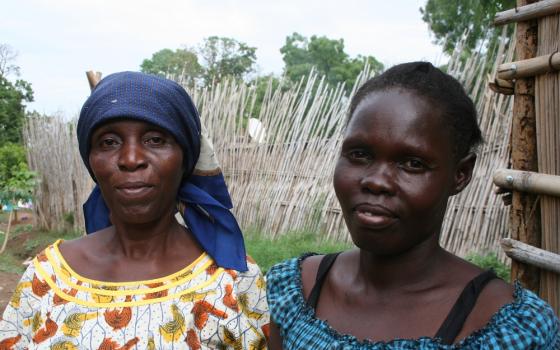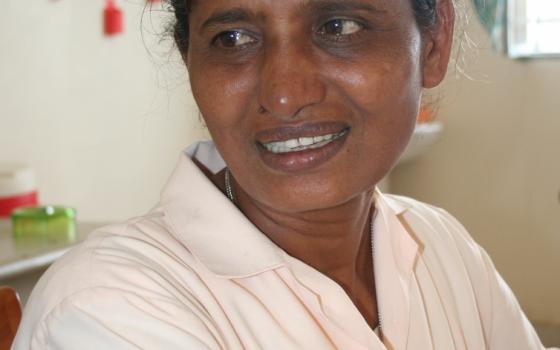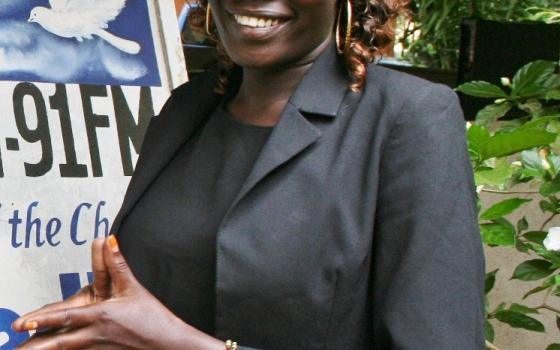“If you take care of the women, you take care of the nation.”
– Ayot Lilli John, women’s advocate and radio host in Juba
The story of a puzzling, confounding and needless war is the story of women.
How is that possible? In South Sudan, women don’t fight wars, you might say. But women, as well as children, are war’s most vulnerable victims. They make up the majority of those living in displacement camps. And women are targets of men at war – targets of violence, particularly sexual violence.
For the moment, an uneasy peace – borne from several peace agreements, one that collapsed and one that still has yet to prove durable -- has settled over a country where civil conflict has taken a steep toll during the last half year. (And that follows a decades-long war of independence from Sudan.)
But the conflict in South Sudan, say some observers, may not yet be over, and women have been leaders in grass-roots demonstrations to end the conflict.
“War continues to take place, and so it is a challenge to have continuous development, especially for women,” said Sr. Micky Kulandai, the mother superior in Juba of the Daughters of Mary Immaculate Sisters.
The order has a specific focus on working among women – and for a very particular reason, she told me one afternoon in the order’s residence on the outskirts of Juba.
“We go to the women first,” said Kulandai, “because then it goes around to the whole.”
She glanced across the table at Sr. Amala Francis, who coordinates the projects for the order’s work in the capital city. Francis took up the thought. “Women are the messengers,” Francis said. “They are vulnerable, but they can teach the women, they can teach the children and they can teach the men.”
In Juba, formal demonstrations for peace, and the informal talk among women in the streets and in homes about the anxiety over war, are not surprising.
It falls to women to keep families together in the midst of chaos, insecurity and death. And the intangibles – the way things get lost in a country at war, like a commitment to education, to literacy, to health – are all of concern of women.
“Their husbands have been killed, so it is up to women to secure their lives and the lives of their children,” said Ayot Lilli John, 28, a women’s advocate and a host of a weekly program at the Catholic diocesan radio station in Juba.
But to secure lives is far from easy: food is scarce, homes have been destroyed. “Men are doing their thing,” John said, “but we women don’t know what they are aiming at.” Put another way, women in South Sudan are frustrated and at a loss to determine what exactly the current conflict is really about. They are fed up.
“Women are now taking care of everything,” she said.
And yet while they are keeping the day-to-day life of the country going, women are not being treated well even under South Sudanese law, observers say.
“[P]atriarchal laws continue to be applied, harming women, threatening their security, and relegating them to inferior positions in their homes and communities,” said a study by the Geneva-based advocacy group Small Arms Survey.
Take the issue of sexual violence, for example. The study found that while the laws in South Sudan prohibit rape and other acts of sexual violence, “most sexual violence cases do not make it to the courts. Women are often made to marry their rapists, an option preferred by some as it prevents men from going to jail and avoids the stigma attached to women who are known to have been raped.”
Equally problematic is that it remains difficult for women to report acts of rape and sexual violence to authorities, and not only because of cultural stigma. Police, who have little knowledge or understanding of women’s rights, often simply send women home “to address the issue within their families,” the report said. “Women complain that police meet reports of sexual violence with indifference or counter-accusations.”
Police have even arrested rape survivors for adultery or have “incarcerated them for their own ‘protection’ until a perpetrator was caught. Police insensitivity can be a significant barrier for women who are seeking protection,” the study said.
That is one issue. Other issues important to women – income, jobs, education – that need addressing by the country’s leaders are never far away from the Juba neighborhood of High Jerusalem, where neighbors Agnes Aliardo, 37, and Constance Langoya, 50, reside.
Neither woman is a stranger to violence: both experienced the terrors of gun battles in December and January. And not far from where the two women live, gun smuggling and transfers remain common.
“The bullets started late at night,” Langoya recalled, and the neighborhood experienced blocked roads and a heavy military presence until about April. “We still don’t know if it was rebels or government forces,” she said. “They were all wearing the same uniforms.”
For now, the neighborhood is quiet. “I thank God there is a big change and I feel more at peace,” she said.
Yet the balm of peace, even if it is uneasy and uncertain, cannot mask the struggles of women who faced troubles and challenges before the recent violence.
Aliardo came to Juba in 2012 from Sudan; she left what was then southern Sudan to work in the Sudanese capital of Khartoum at age 18 because of the ongoing civil war between north and south.
She worked as cleaner at a heart clinic in Khartoum but like others from the south was made to feel unwanted after South Sudan’s independence in 2011. “‘You’re no longer needed,’ ” she was told and made the journey back with her six children; her husband left the family to return to his native village in South Sudan.
In the chaos of last December Aliardo and family found themselves displaced but eventually moved in with other relatives in the High Jerusalem neighborhood. For now, Aliardo is a single mother and, by her own description, dearly, dearly misses Khartoum.
Langoya’s story differs in particulars: She is one of the thousands from neighboring Uganda who live in South Sudan – she is married to a Sudanese. But as a social worker, Langoya has not found work in her profession. In order to support her family Langoya works as a housecleaner at a nearby hotel
Both express frustration about the situation for women. As Langoya notes, the particular challenges in South Sudan are related to both gender discrimination and cultural practices. “Certain cultures still believe the woman’s place is in the kitchen,” said Langoya. “Only when those constraints are broken, will girls be given real opportunities.”
In the small hatched home where she is living now (“It’s small, but the roof is okay, it’s not leaking and for now this is home . . . it’s a new beginning”), Aliardo expresses hope that Linda, her 7-year-old daughter, “can go to school, learn to read, have a career.”
Education is key, Langoya said, and she worries what a lack of education can do to both genders. For girls, it means continued illiteracy and heartbreak; for boys, “without schools they have no other aspirations,” she said.
“When their minds are idle, their minds take them wherever . . . .” Her voice trailed off, leaving a common fear hanging in the air: that un-educated male teenagers and young men continue to be drawn to the life of war and battle, of rape and looting, because they have nothing else to do.
As late afternoon rain clouds appeared, and as the interior of Aliardo’s small home darkened a bit, both women sighed about this dynamic. There is constant anxiety in South Sudan about the fate of young men in a society with so much underlying poverty.
The two find more hope in the idea of women taking the reins and helping themselves. Both are part of a small initiative begun by Sr. Cathy Arata, a member of the School Sisters of Notre Dame, who works with the humanitarian coalition Solidarity with South Sudan.
After hearing so much about need among the women in the High Jerusalem neighborhood, Arata helped organize a group of women who received small loans to start small-scale businesses.
“We saw that we had different needs, but the bond between us is that we are women, we have roles that are often taken for granted and we have different strengths that we can develop as women, as individuals and as families,” Langoya said.
What that means practically is that each woman in the group of nearly 20 (both South Sudanese and Ugandan) received a loan for s mall income-generating activity – for Aliardo, making and selling juice, and for Langoya, selling cell phone “air time.”
The results? “So far, so good,” said Langoya, though Aliardo said it would help her business if she had her own freezer. “Maybe with time, things will improve,” she said.
That sentiment applies overall to the situation of the women in the self-help group. All but one of the women had paid back their first installment on the loans, said Arata, and the group has worked well and been a cohesive force for good. Not, as she says with characteristic modesty, because of what she has done but because of what the women themselves have been able to accomplish.
Small steps can help, said Lorraine Bramwell, country director in South Sudan for Catholic Relief Services.
With women doing so much of the physical work in the household – cleaning, cooking, fetching water and fuel – simply making and then saving money “in the family raises their status in the household,” Bramwell said. “Women can have more say in how money is spent and have more of a role in the household.”
That is a cornerstone in the work that Ayot Lilli John, the women’s advocate and radio host does in connection with the South Sudan Young Women Agency. “It’s important that women be able to stand on their own and not be dependent on men.”
That is not easy, said John, who earned a bachelor’s degree in economics while attending school part-time. The vast majority of women in South Sudan, by some estimates 80 to 98 percent, cannot read or write, and the recent conflict has only set back efforts to advance literacy among women.
Literacy is key, John said. Without it, “women remain in the back,” she said. “They cannot stand or defend their rights.”
And yet there are stubborn norms that perpetuate the cycle of illiteracy in South Sudan. A dowry is held up as vitally important; an “educated lady,” as John put it, is not seen as desirable as a young, uneducated woman (and one who is preferably a virgin). “That is why people refuse to take girls to school,” John told me one afternoon as I spoke to her in the studios of Bakhita Radio, the Juba Catholic Archdiocese’s station.
She paused and acknowledged that given the tumult of war and the legacy of strife, it is difficult for both South Sudanese women and men to envision bigger and better things for themselves and their families.
“It is difficult to pull yourself out of that environment,” John said. But she is adamant that equality of women will ultimately help both men and women and that, over the course of time, it will happen. “The more educated women you have, the more the country will grow and develop,” she said. “We have to put women out front.”
“If you take care of the women, you take care of the nation.”
Sr. Amala Francis agreed that male domination over women “is harming development in South Sudan overall,” and that the legacy of continuing war has only skewed priorities favoring war over peace.
“What’s the point of arms?” she said of the proliferation of guns and weaponry in a country where two million died in the decades-long civil war; one million have been displaced in the recent conflict; where a third of children are underfed; and 98 percent of people, by some estimates, live on less than $1 a day.
“You say you are protecting the people. But the people are starving.”
[Chris Herlinger is a contributing writer to NCR on humanitarian and international issues, an author and the senior writer for Church World Service.]
GSR South Sudan reports by Chris Herlinger - Easter hope for South Sudan and
The voice of constant motion: Sr. Anne Kiragu
On NCRonline.org - In South Sudan, 'everything they are doing, they are doing with tears'



